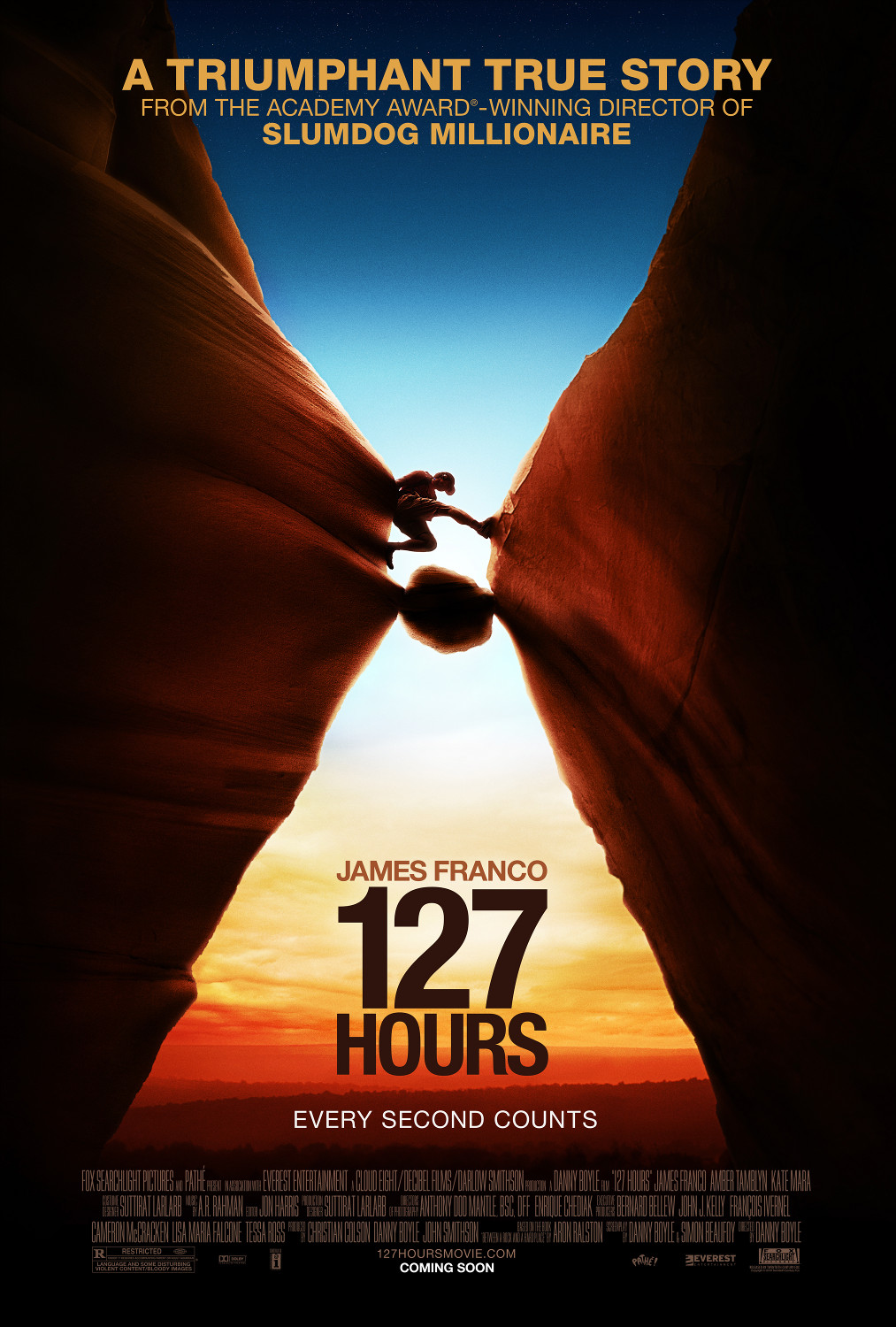When we first meet Aron Ralston (James Franco), he’s careening through a Utah desert on a mountain bike. Bass-heavy music is thumping in his headphones, and he’s the embodiment of pure adrenaline and adventure. At one point he takes a nasty digger, laughs, and then snaps a photo– just to savor the moment a little before hopping back up and zooming on.
Moments later, he comes to another screeching halt, but this one’s much different. Trapped in a deep canyon with his right arm pinned under a heavy rock, he can’t go anywhere, can barely even see daylight, and there’s no one around for miles. The music stops, and it’s so quiet that you literally hear an ant walking.
127 Hours is a dazzling study of contrasts. Filmmaker Danny Boyle has taken the true story of a man who’s stuck in a very small, very isolated, very lonely place and turned it into a breathtaking, heart-pounding film that’s is as exciting as any roller coaster ride.
Above all, though, it’s as entertaining as anything to hit screens this year.
After a brief prologue that finds Ralston offering to guide two lost young women on their way through the Blue John Canyon, he jaunts on alone. No one knows he’s here, and he has no way of letting people know he’s here. On any other day, that’s just a stupid mistake. On this particular day, it could be fatal.
Once trapped, Ralston at first can’t believe it. Surely he can pull his arm out, or bump the rock enough so he can get free. After only a few minutes, though, he knows it won’t be that easy, and suddenly all the equipment he brought with him (camera, ropes, multi-tool) must be looked at as survival gear instead of amenities.
Over the next five days, Ralston bounces through most of the Kubler-Ross cycle, plus the added bonus of hallucinations. He savors every single drop of water in his bottle like it’s more precious than gold. He realizes (surprisingly early on) that amputation of his own arm will be his only ticket out. And he films a series of heartfelt messages to his parents. In less than a week, Ralston faces death, accepts death, and then spits in death’s face as he walks away into the sun.
This is a role that most actors would run away from, screaming, due to the need for a complete abandonment of any pretense. This is not a glamour role by any means; it requires the actor to confront emotions and situations that very few people on Earth have ever had to. Thank heavens for James Franco.
His performance is among the best and most powerful of this generation, not only because of the wide range of emotions he has to convey, but because he must take a man who made all kinds of foolish errors and turn him into someone likeable and even pitiable.
Boyle, likewise, is charged with not one, but two of the most daunting tasks that can face a director– not only does he have to successfully tell a story that the audience already knows the ending of, but he has to shoot it entirely in a single space not much bigger than a broom closet, and infinitely more claustrophobic.
There are moments in 127 Hours that will terrify you, there are other moments that will make you cry, and there’s one extremely well-placed scene (we know we’re getting near the end) that may very well have you laughing out loud. But more than anything else, it will captivate you and make you appreciate (even more, perhaps) exactly how talented Boyle and Franco are in their respective professions.
The amputation scene is gory, yes. It’s brutal, and it’s raw, but it’s also vital to the story, and it’s over relatively quickly. If you’re still worried, rest assured that you’ll know when to close your eyes, and you’ll know when to open them again. The real issue comes as the credits begin to roll. Surely if Aron Ralston spent more than an hour cutting his own arm off, you can (and you should) spend 90 minutes witnessing one of the most inspirational, exceptional, and flat-out incredible movies in recent memory.
5/5 stars
